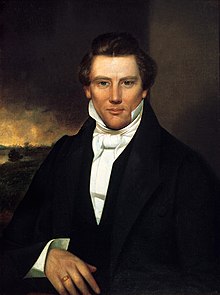Our website is made possible by displaying online advertisements to our visitors.
Please consider supporting us by disabling your ad blocker.
Joseph Smith
| Joseph Smith | |
|---|---|
 Portrait, c. 1842 | |
| 1st President of the Church of Christ[a] | |
| April 6, 1830 – June 27, 1844 | |
| Successor | Disputed[b] |
| End reason | Death |
| 2nd Mayor of Nauvoo, Illinois | |
| In office | |
| May 19, 1842[4] – June 27, 1844 | |
| Predecessor | John C. Bennett |
| Successor | Chancy Robison[5] |
| Political party | Independent |
| Personal details | |
| Born | December 23, 1805 Sharon, Vermont, U.S. |
| Died | June 27, 1844 (aged 38) Carthage, Illinois, U.S. |
| Cause of death | Gunshot wounds |
| Resting place | Smith Family Cemetery, Nauvoo, Illinois, U.S. 40°32′26″N 91°23′33″W / 40.54052°N 91.39244°W |
| Known For | Founding Mormonism |
| Spouse(s) | |
| Children | |
| Parents |
|
| Relatives |
|
| Signature | |
| This article is part of a series on |
| Joseph Smith |
|---|
Joseph Smith Jr. (December 23, 1805 – June 27, 1844) was an American religious and political leader and the founder of Mormonism and the Latter Day Saint movement. Publishing the Book of Mormon at the age of 24, Smith attracted tens of thousands of followers by the time of his death fourteen years later. The religion he founded is followed by millions of global adherents and several churches, the largest of which is the Church of Jesus Christ of Latter-day Saints (LDS Church).
Born in Sharon, Vermont, Smith moved with his family to Western New York, following a series of crop failures in 1816. Living in an area of intense religious revivalism during the Second Great Awakening, Smith reported experiencing a series of visions. The first of these was in 1820, when he saw "two personages" (whom he eventually described as God the Father and Jesus Christ). In 1823, he said he was visited by an angel who directed him to a buried book of golden plates inscribed with a Judeo-Christian history of an ancient American civilization. In 1830, Smith published the Book of Mormon, which he described as an English translation of those plates. The same year he organized the Church of Christ, calling it a restoration of the early Christian Church. Members of the church were later called Latter Day Saints or Mormons.
In 1831, Smith and his followers moved west, planning to build a communal Zion in the American heartland. They first gathered in Kirtland, Ohio, and established an outpost in Independence, Missouri, which was intended to be Zion's "center place." During the 1830s, Smith sent out missionaries, published revelations, and supervised construction of the Kirtland Temple. Smith and his followers left Ohio and Missouri after the collapse of the church-sponsored Kirtland Safety Society and violent skirmishes with non-Mormon Missourians escalated into the Mormon extermination order. They established a new settlement at Nauvoo, Illinois which quickly grew to be the second-largest city in Illinois during Smith’s mayoralty.
Joseph Smith launched a presidential campaign in 1844 on a platform which proposed gradually ending slavery, protecting the liberties of Latter Day Saints and other minorities, reducing the size of Congress, reestablishing a national bank, reforming prisons, and annexing Texas, California, and Oregon. During his campaign, Smith and the Nauvoo City Council ordered the destruction of the Nauvoo Expositor‘s printing press after it criticized Smith's power and his practice of polygamy. This inflamed anti-Mormon sentiment. Fearing an invasion of Nauvoo, Smith rode to Carthage, Illinois, to stand trial, but was shot and killed by a mob that stormed the jailhouse. Smith was the first U.S. presidential candidate to be assassinated.
During his ministry, Smith published numerous documents and texts, many of which he attributed to divine inspiration and revelation from God. He dictated the majority of these in the first-person, saying they were the writings of ancient prophets or expressed the voice of God. His followers accepted his teachings as prophetic and revelatory, and several of these texts were canonized by denominations of the Latter Day Saint movement, which continue to treat them as scripture. Smith's teachings discuss God's nature, cosmology, family structures, political organization, and religious community and authority. Mormons generally regard Smith as a prophet comparable to Moses and Elijah. Several religious denominations identify as the continuation of the church that he organized, including the LDS Church and the Community of Christ.
- ^ Shields, Steven (1990). Divergent Paths of the Restoration (fourth ed.). Independence, Missouri: Restoration Research. ISBN 0-942284-00-3.
- ^ Joseph Smith. "Minutes of a Conference". Evening and Morning Star. Vol. 2, no. 20. Kirtland, OH. p. 160. Retrieved May 5, 2023.
- ^ "D&C 115:4".
- ^ Garr, Arnold K. (Spring 2002). "Joseph Smith: Mayor of Nauvoo" (PDF). Mormon Historical Studies. 1 (1): 5–6.
- ^ Jenson, Andrew, ed. (1888). The Historical Record: A Monthly Periodical. Salt Lake City. p. 843. Retrieved July 23, 2013.
{{cite book}}: CS1 maint: location missing publisher (link)
Cite error: There are <ref group=lower-alpha> tags or {{efn}} templates on this page, but the references will not show without a {{reflist|group=lower-alpha}} template or {{notelist}} template (see the help page).
Previous Page Next Page



